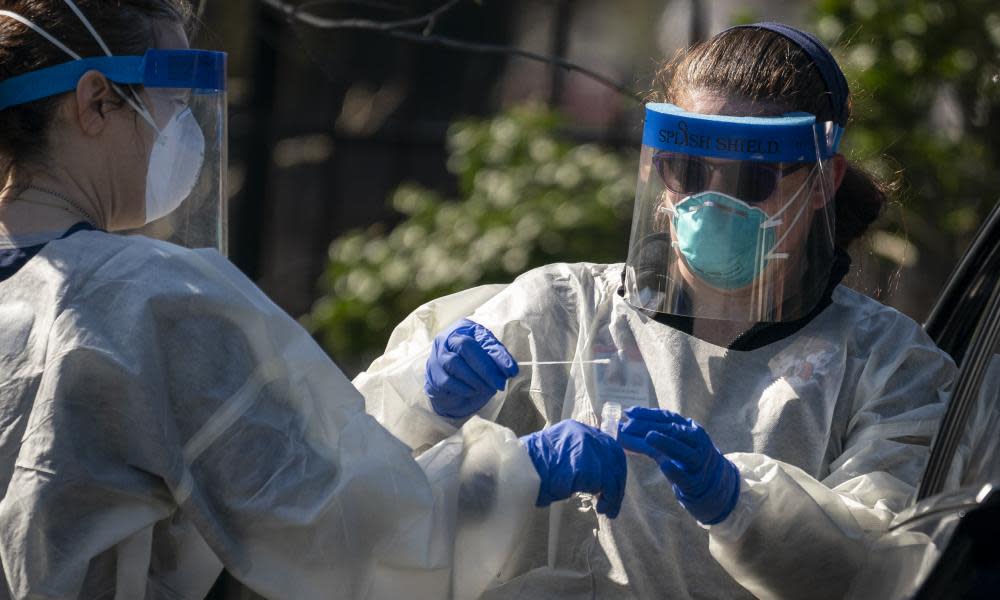Exclusive: nearly 600 US health workers died of Covid-19 – and the toll is rising

Nearly 600 frontline healthcare workers have died of Covid-19, according to Lost on the Frontline, a project launched by the Guardian and Kaiser Health News (KHN) that aims to count, verify and memorialize and every healthcare worker who dies during the pandemic.
The tally includes doctors, nurses and paramedics, as well as crucial healthcare support staff such as hospital janitors, administrators and nursing home workers, who have put their own lives at risk during the pandemic to help care for others. Lost on the Frontline has now published the names and obituaries for more than 100 workers.
A majority of those documented were identified as people of color, mostly African American and Asian/Pacific Islander. Profiles of more victims, and an updated count, will be added to our news sites twice weekly going forward.
There is no other comprehensive accounting of US healthcare workers’ deaths. The Centers for Disease Control and Prevention (CDC) has counted 368 Covid deaths among healthcare workers, but acknowledges its tally is an undercount. The CDC does not identify individuals.
The Guardian and KHN are building an interactive, public-facing database that will also track factors such as race and ethnicity, age, profession, location and whether the workers had adequate access to protective gear. The database – to be released this summer – will offer insight into the workings and failings of the US healthcare system during the pandemic.
In addition to tracking deaths, Lost on the Frontline reports on the challenges healthcare workers are facing during the pandemic. Many were forced to reuse masks countless times amid widespread equipment shortages. Others had only trash bags for protection. Some deaths have been met with employers’ silence or denials that they were infected at work.
The number released today reflects the 586 names currently in the Lost on the Frontline internal database, which have been collected from family members, friends and colleagues of the deceased, media reports and unions, among other sources. Reporters at the Guardian and KHN are independently confirming each death by contacting family members, employers, medical examiners and others before publishing names and obituaries on our sites. More than a dozen journalists across two newsrooms – as well as student journalists – are involved in the project.
This project aims to capture the human stories of compassion and heroism behind the statistics. None of the healthcare workers honored started 2020 knowing that simply showing up to work might expose them to a virus that would kill them.
When the crisis hit, they met the challenge. They steeled themselves against the long hours. Emergency medical technicians raced to ambulances to help. Others did the cleanup, maintenance, security or transportation jobs needed to keep operations running smoothly.
They undertook their work with passion and dedication. They were also beloved spouses, parents, friends, military veterans and community activists.
Among those lost were Dr Priya Khanna, a nephrologist, who continued to review her patients’ charts until she was put on a ventilator. Her father, a retired surgeon, succumbed to the disease just days after his daughter.
Susana Pabatao, one of thousands of Philippine health providers in the US, became a nurse in her late 40s. Susana died just days after her husband, Alfredo, who was also infected with Covid-19.
Dr James Goodrich, a renowned pediatric neurosurgeon, acclaimed for separating conjoined twins, was also remembered as a renaissance man who collected antique medical books, loved fine wines and played the didgeridoo.
Some of the first to die faced troubling conditions at work. Rose Harrison, 60, a registered nurse, wore no mask while taking care of a Covid-19 patient at an Alabama nursing home, according to her daughter. She felt pressured to work until the day she was hospitalized. The nursing home did not respond to requests for comment.
Thomas Soto, 59, a Brooklyn radiology clerk faced delays in accessing protective gear, including a mask, even as his hospital was overwhelmed with Covid-19 patients, his son said. The hospital did not respond to requests for comment.
The Lost on the Frontline team is documenting other worrying trends. Healthcare workers across the US said failures in communication left them unaware they were working alongside people infected with the virus. And occupational safety experts raised alarms about CDC guidance permitting workers treating Covid-19 patients to wear surgical masks – which are far less protective than N95 masks.
The Occupational Safety and Health Administration, the federal agency responsible for protecting workers, has launched dozens of fatality investigations into health workers’ deaths. But recent agency memos raise doubts that many employers will be held responsible for negligence.
As public health guidelines have largely prevented traditional gatherings of mourners, survivors have found new ways to honor the dead: in Manhattan, a medical resident played a violin tribute for a fallen co-worker; a nurses union placed 88 pairs of shoes outside the White House commemorating those who had died among their ranks; fire departments have lined up trucks for funeral processions and held “last call” ceremonies for EMTs.
The Lost on the Frontline death toll includes only healthcare workers who were potentially exposed while caring for or supporting Covid-19 patients. It does not, for example, include retired doctors who died from the virus but were not working during the pandemic.
The number of reported deaths is expected to grow. But as reporters work to confirm each case, individual deaths may not meet our criteria for inclusion – and, therefore, may be removed from our count.
You can read our first 100 profiles here. And if you know of a healthcare worker who died of Covid-19, please share their story with us.


